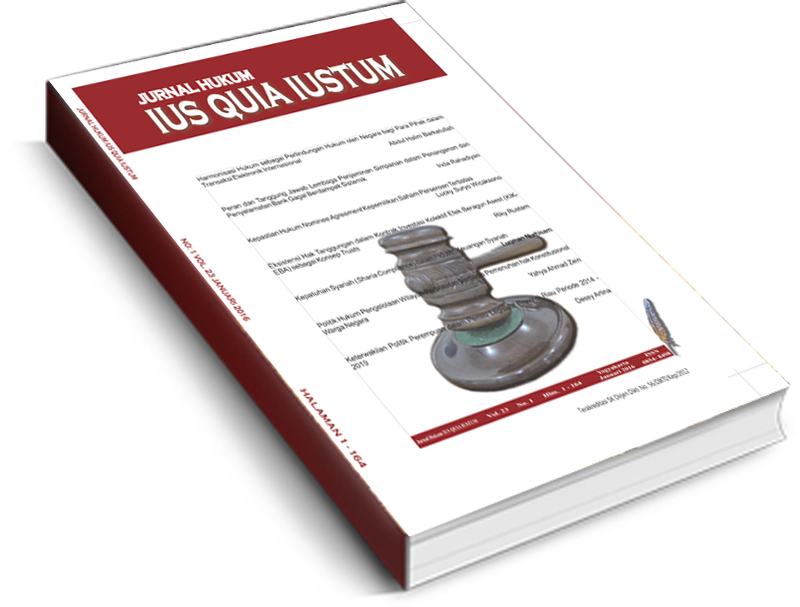Main Article Content
Abstract
Keywords
Article Details
Authors who publish with this journal agree to the following terms:
a. Authors retain copyright and grant the journal right of first publication with the work simultaneously licensed under a Creative Commons Attribution License that allows others to share the work with an acknowledgement of the work's authorship and initial publication in this journal.
b. Authors are able to enter into separate, additional contractual arrangements for the non-exclusive distribution of the journal's published version of the work (e.g., post it to an institutional repository or publish it in a book), with an acknowledgement of its initial publication in this journal.
References
- Daftar Pustaka
- Buku
- Arief, Barda Nawawi, Bunga Rampai Kebijakan Hukum Pidana, Citra Aditya Bakti, Bandung, 1996.
- Hamzah, Andi, Penegakan Hukum Lingkungan, Sinar Grafika, Jakarta, 2005.
- Machmud, Syahrul, Penegakan Hukum Lingkungan Indonesia, Graha Ilmu, Yogyakarta, 2012.
- Manan, Bagir, Hubungan antara Pusat dan Daerah Menurut UUD 1945, Jakarta, Pustaka Sinar Harapan, 1994.
- Rahmadi, Takdir, Hukum Pengelolaan Bahan Berbahaya dan Beracun, Airlangga University Press, Surabaya, 2003.
- Rangkuti, Siti Sundari, Hukum Lingkungan dan Kebijaksanaan Lingkungan Nasional, Airlangga University Press, Surabaya.
- Sulistina, Teguh & Aria Zurnetti, Hukum Pidana, Horizon Baru Pasca Reformasi, Rajawali Pers, Jakarta, 2011.
- Supriadi, Hukum Lingkungan Indonesia: Sebuah Pengantar, Sinar Grafika, Jakarta, 2006.
- Artikel Jurnal
- Ariefianto, Harry Agung, Penerapan Sanksi Administrasi Pencemaran Lingkungan Hidup Akibat Kegiatan Industri, Unnes Law Journal, Vol. 4 No. 1, 2015.
- Kartono. “Penegakan Hukum Administratif dalam Undang-Undang Perlindungan dan Pengelolaan Lingkungan Hidupâ€, Jurnal Dinamika Hukum, Volume 9 Nomor 3, September 2009.
- Moestadji. “Peran Hukum dalam Mewujudkan Konsep Pembangunan Berkelanjutanâ€, Jurnal Hukum Lingkungan, Tahun I Nomor 1, Jakarta, ICEL.
- Widyawati, Lidya Suryani. “Ultimum Remedium dalam Bidang Lingkungan Hidupâ€, Jurnal Hukum Ius Quia Istum, Volume 22, Nomor 1, Januari 2015.
- Peraturan Perundang-Undangan Undang-Undang Nomor 32 Tahun 2009 tentang Perlindungan dan Pengelolaan Lingkungan Hidup (Lembaran Negara Republik Indonesia Tahun 2009 Nomor 140).
- Peraturan Pemerintah Nomor 101 Tahun 2014 tentang Pengelolaan Limbah Bahan Berbahaya dan Beracun (Lembaran Negara Republik Indonesia Tahun 2014 Tahun 333).
References
Daftar Pustaka
Buku
Arief, Barda Nawawi, Bunga Rampai Kebijakan Hukum Pidana, Citra Aditya Bakti, Bandung, 1996.
Hamzah, Andi, Penegakan Hukum Lingkungan, Sinar Grafika, Jakarta, 2005.
Machmud, Syahrul, Penegakan Hukum Lingkungan Indonesia, Graha Ilmu, Yogyakarta, 2012.
Manan, Bagir, Hubungan antara Pusat dan Daerah Menurut UUD 1945, Jakarta, Pustaka Sinar Harapan, 1994.
Rahmadi, Takdir, Hukum Pengelolaan Bahan Berbahaya dan Beracun, Airlangga University Press, Surabaya, 2003.
Rangkuti, Siti Sundari, Hukum Lingkungan dan Kebijaksanaan Lingkungan Nasional, Airlangga University Press, Surabaya.
Sulistina, Teguh & Aria Zurnetti, Hukum Pidana, Horizon Baru Pasca Reformasi, Rajawali Pers, Jakarta, 2011.
Supriadi, Hukum Lingkungan Indonesia: Sebuah Pengantar, Sinar Grafika, Jakarta, 2006.
Artikel Jurnal
Ariefianto, Harry Agung, Penerapan Sanksi Administrasi Pencemaran Lingkungan Hidup Akibat Kegiatan Industri, Unnes Law Journal, Vol. 4 No. 1, 2015.
Kartono. “Penegakan Hukum Administratif dalam Undang-Undang Perlindungan dan Pengelolaan Lingkungan Hidupâ€, Jurnal Dinamika Hukum, Volume 9 Nomor 3, September 2009.
Moestadji. “Peran Hukum dalam Mewujudkan Konsep Pembangunan Berkelanjutanâ€, Jurnal Hukum Lingkungan, Tahun I Nomor 1, Jakarta, ICEL.
Widyawati, Lidya Suryani. “Ultimum Remedium dalam Bidang Lingkungan Hidupâ€, Jurnal Hukum Ius Quia Istum, Volume 22, Nomor 1, Januari 2015.
Peraturan Perundang-Undangan Undang-Undang Nomor 32 Tahun 2009 tentang Perlindungan dan Pengelolaan Lingkungan Hidup (Lembaran Negara Republik Indonesia Tahun 2009 Nomor 140).
Peraturan Pemerintah Nomor 101 Tahun 2014 tentang Pengelolaan Limbah Bahan Berbahaya dan Beracun (Lembaran Negara Republik Indonesia Tahun 2014 Tahun 333).




